Choosing eco-friendly pest control for your garden is like inviting nature’s superheroes to your backyard! Instead of harsh chemicals, you can use natural solutions, like garlic spray and beneficial insects, to keep pesky critters at bay. It’s healthier for your plants, families, and furry friends. Plus, who wouldn’t want a garden buzzing with happy ladybugs and colorful blooms? You’ll create a vibrant ecosystem that thrives together! Ready to discover how to attract those helpful bugs?
Understanding Eco-Friendly Pest Control

When it comes to your garden, pests can feel like unwelcome party crashers, arriving uninvited and making a mess of your beautiful blooms. But don’t despair! Embracing integrated pest management (IPM) is your ace in the hole. This innovative approach combines monitoring, prevention, and environmentally-friendly tactics, creating harmony in your sustainable gardening oasis. Think of it as a symphony, where every note plays a role in keeping your plants safe. Imagine using beneficial insects, like ladybugs, as your garden’s little bodyguards! You can also try natural repellents, like garlic spray—nature’s version of bouncers. With IPM, you’re not just fighting pests; you’re nurturing a thriving ecosystem. So, let’s kick those unwanted guests to the curb together! Your garden deserves it!
Benefits of Using Natural Pest Solutions
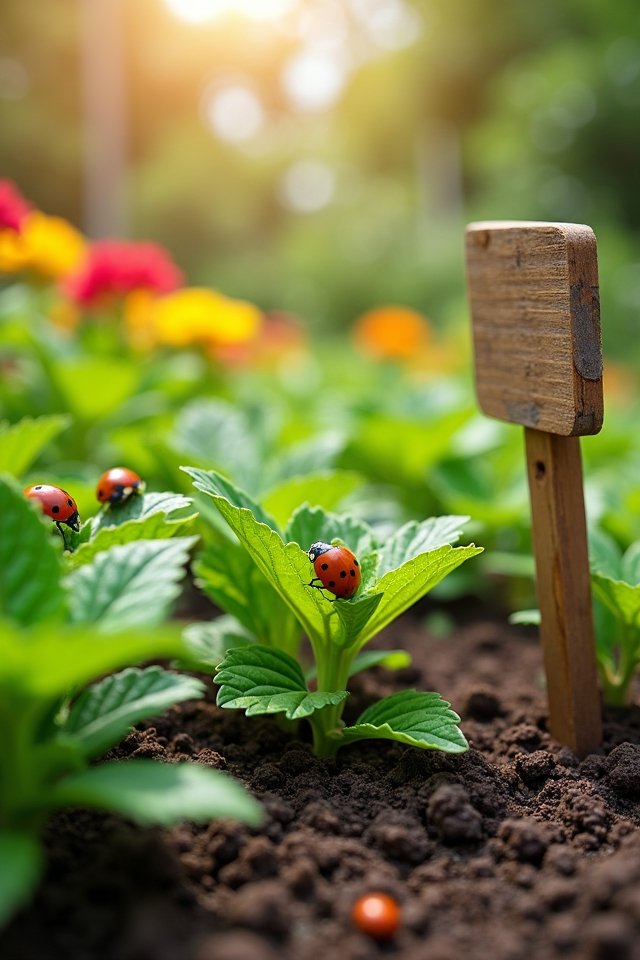
Using natural pest solutions in your garden doesn’t just protect your precious plants; it transforms your outdoor space into a thriving sanctuary! Envision this: vibrant veggies and flowers unfurling their petals, free from the dread of harmful chemicals. Natural repellents, like garlic spray or essential oils, are your secret weapons against uninvited guests! Plus, when you accept holistic approaches, you’re not just battling pests; you’re nurturing the balance of your ecosystem. Imagine ladybugs dining on aphids while bees buzz happily around. Who wouldn’t love that? You’ll breathe easier knowing your garden is friendly for beneficial critters and your family! So, why stick to harsh chemicals when nature’s solutions abound? Immerse yourself and make your garden a haven!
Common Eco-Friendly Pest Control Methods
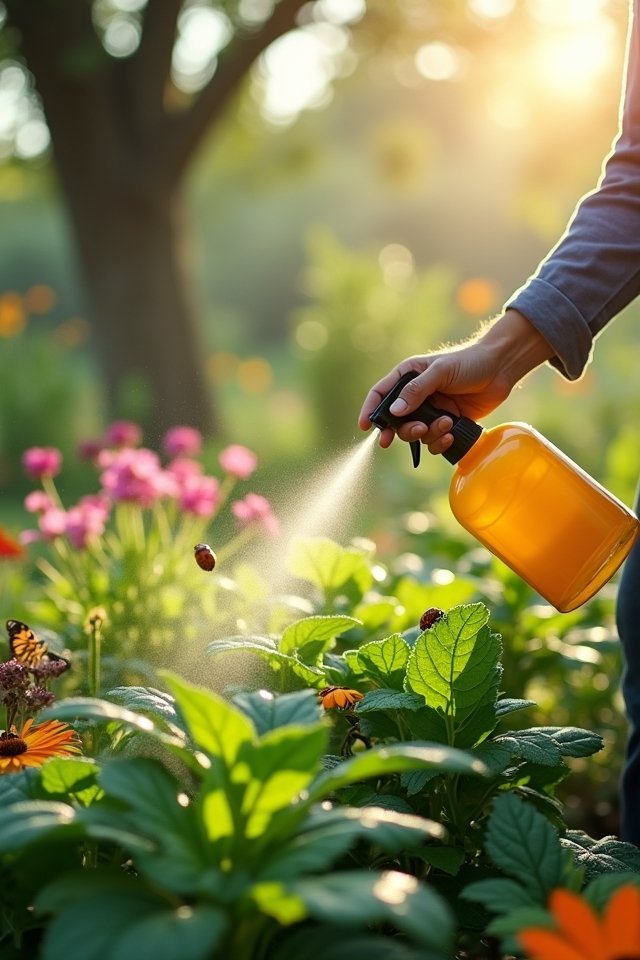
If you want to keep your garden thriving without resorting to nasty chemicals, you’ve got plenty of exciting options at your fingertips! One fantastic method is biological control, which harnesses nature’s own pest-fighting allies. Think ladybugs chowing down on aphids like it’s their favorite buffet! Another innovative approach is using trap crops, which are basically decoys that lure pests away from your prize plants. Imagine planting a tasty treat for those pesky insects, keeping them far from your beloved tomatoes! These eco-friendly methods not only protect your garden but also promote a balanced ecosystem. So, get ready to adopt these smart strategies—your garden, and your conscience, will thank you! Isn’t it fantastic when nature lends a helping hand?
Attracting Beneficial Insects to Your Garden
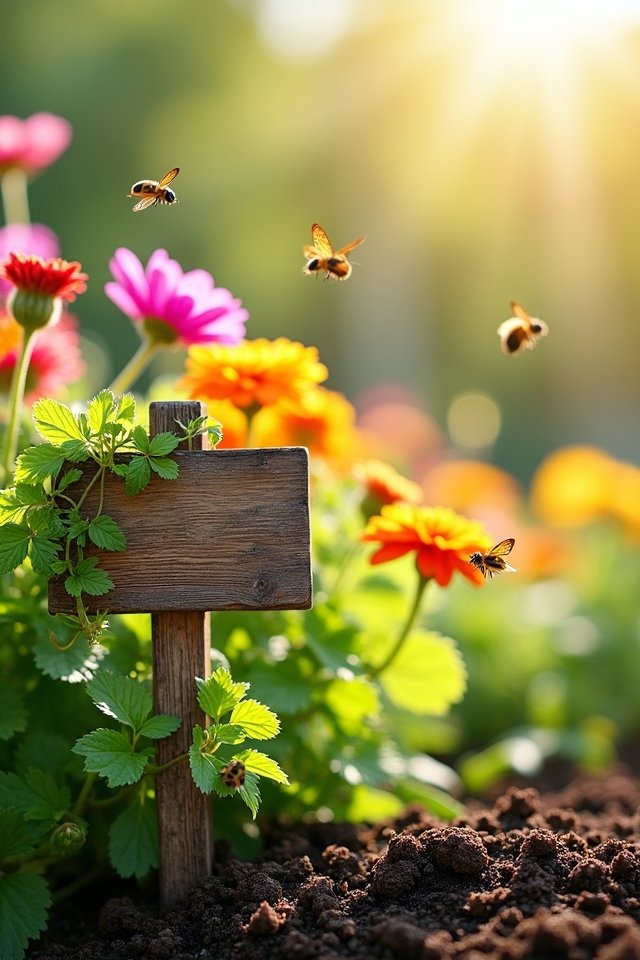
Attracting beneficial insects to your garden is like rolling out the welcome mat for nature’s very own superheroes! Just imagine—colorful butterflies fluttering and bees buzzing, all while they help you grow a thriving garden. To create an inviting space, plant vibrant flowers like sunflowers and lavender, which are great for attracting pollinators. You can also add herbs like basil and dill, inviting ladybugs and lacewings to feast on pesky pests! Keep a variety of plants blooming throughout the seasons, and don’t be shy about leaving some wild areas—these sweet spots are perfect for beneficial insects to call home! So go ahead, inspire these helpful creatures with nature’s buffet and watch your garden transform into a buzzing paradise!
The Role of Companion Planting
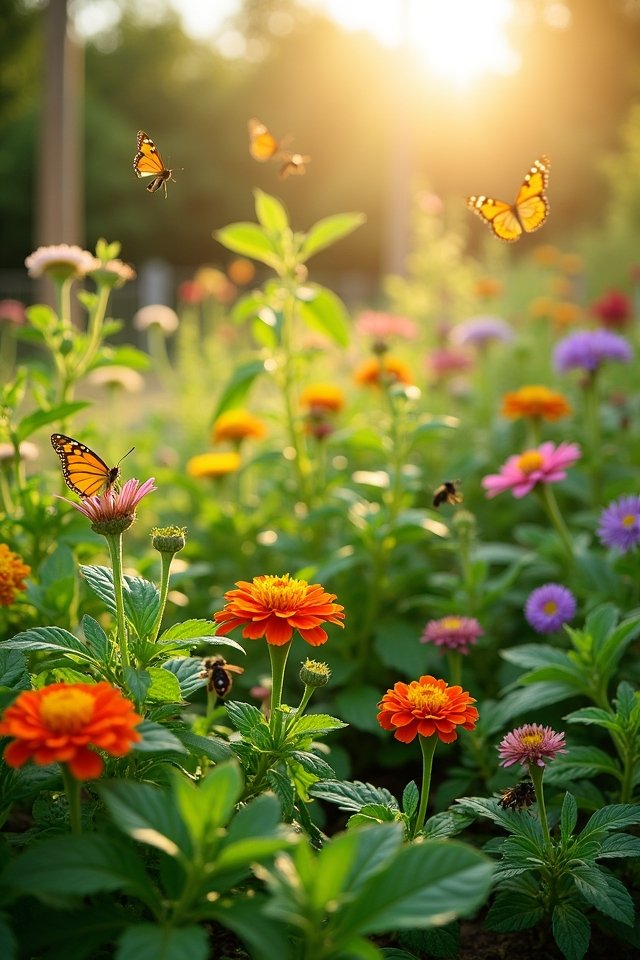
Companion planting is like hosting a dinner party where everyone brings their best dish to the table! It’s all about pairing different plants together for maximum benefit. For instance, if you plant marigolds alongside tomatoes, those cheery blooms act as natural pest deterrents, keeping unwanted critters at bay. Think of your garden as a lively community, where basil buddies up with peppers, boosting flavor and offering protection from pests. You’ll create a harmonious ecosystem, where companion plants support each other like loyal friends! Plus, it’s innovative and fun—experimenting with new combinations spices things up! So why not give it a go? Your garden will thank you with bountiful harvests and reduced chemical use, making Mother Nature proud!
Organic Pesticides: What You Need to Know
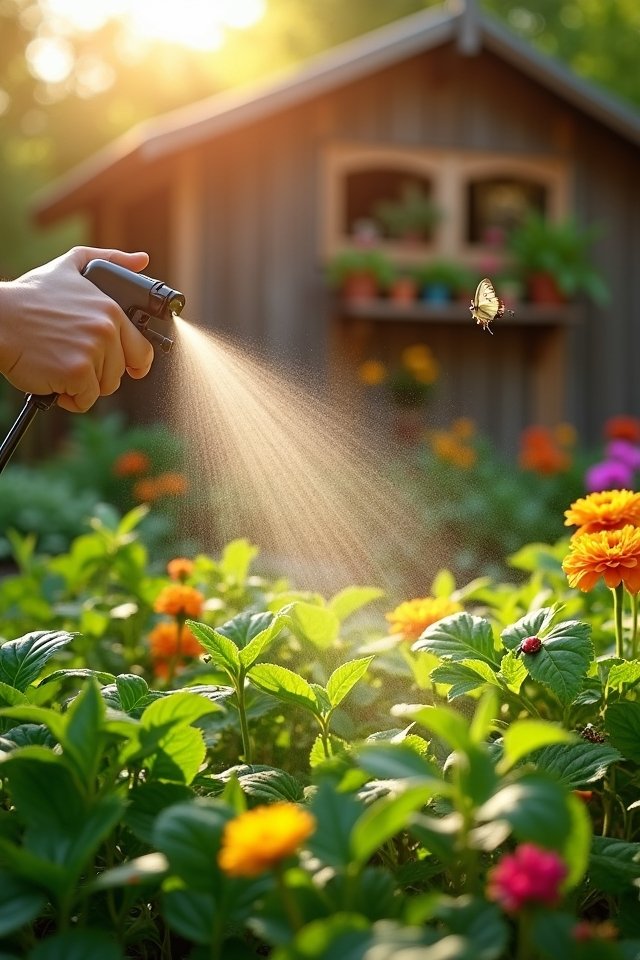
Have you ever wondered how to keep your garden thriving without resorting to harsh chemicals? Organic pesticides might just be your garden’s new best friend! With a solid understanding of organic certification, you can choose products that not only abide by pesticide regulations but also boost your plants’ liveliness. Imagine a thriving garden, buzzing with life and free from synthetic nasties! Look for neem oil or insecticidal soap—nature’s own pest-fighting duo. They’re effective, safe, and even smell somewhat pleasant! Just remember to apply them in the early morning or late evening, so you don’t accidentally recruit beneficial insects as unwitting victims. Go ahead, adopt organic methods, and watch your garden flourish, one eco-friendly spritz at a time!
Soil Health and Pest Management

While you might think of pests as the ultimate garden villains, the real secret to keeping them at bay lies in the soil beneath your feet! Healthy soil is like a superhero, teaming up with beneficial soil microorganisms to create a thriving ecosystem. So how can you guarantee your soil’s health?
- Use organic amendments: Compost, manure, and mulches feed your soil, boosting its ability to nourish plants.
- Encourage microorganisms: They help break down organic matter, making nutrients available for your plants while keeping pests away!
- Rotate your crops: This keeps the soil balanced and disrupts pests’ life cycles.
Caring for your soil isn’t just smart; it’s like giving your garden a protective shield against pesky intruders!
Educating Yourself on Local Pest Species
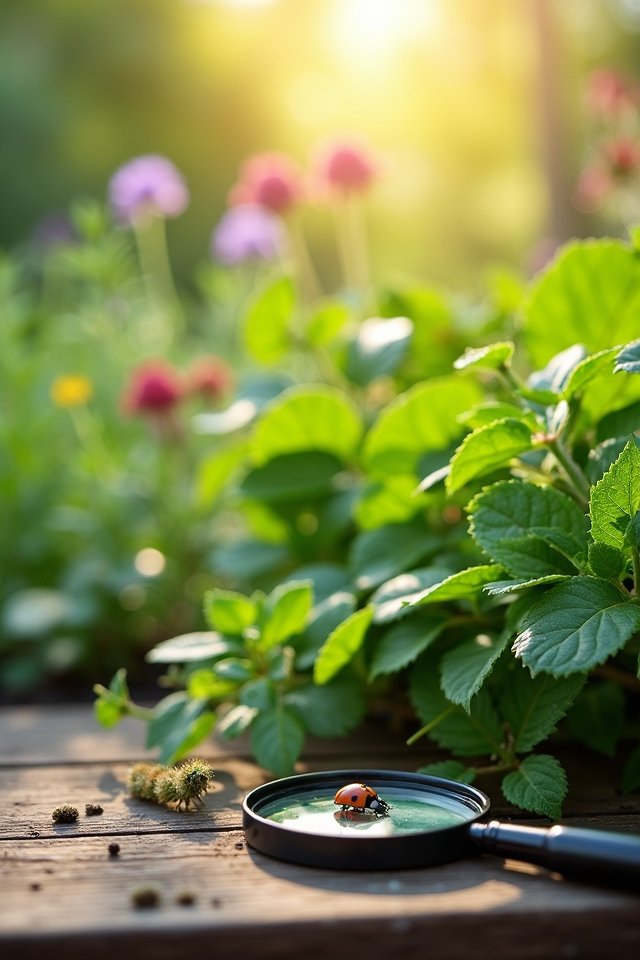
Ever wondered what critters might be lurking in your garden, waiting to turn your thriving plants into their next buffet? Getting to know your local pest species isn’t just smart—it’s essential! Start with pest identification; those little devils can be sneaky. Look for signs like holes in leaves or strange droppings. Next, immerse yourself in lifecycle analysis—understanding when pests are most active can save your plants! For example, if you spot aphids in spring, you know they’re multiplying fast. Think of them like rabbits on a munching mission! By educating yourself, you can launch a preemptive strike against their tiny army. Trust me, there’s nothing quite like protecting your garden with a solid, pest-savvy plan! Happy gardening!
Long-Term Sustainability in Pest Control Practices
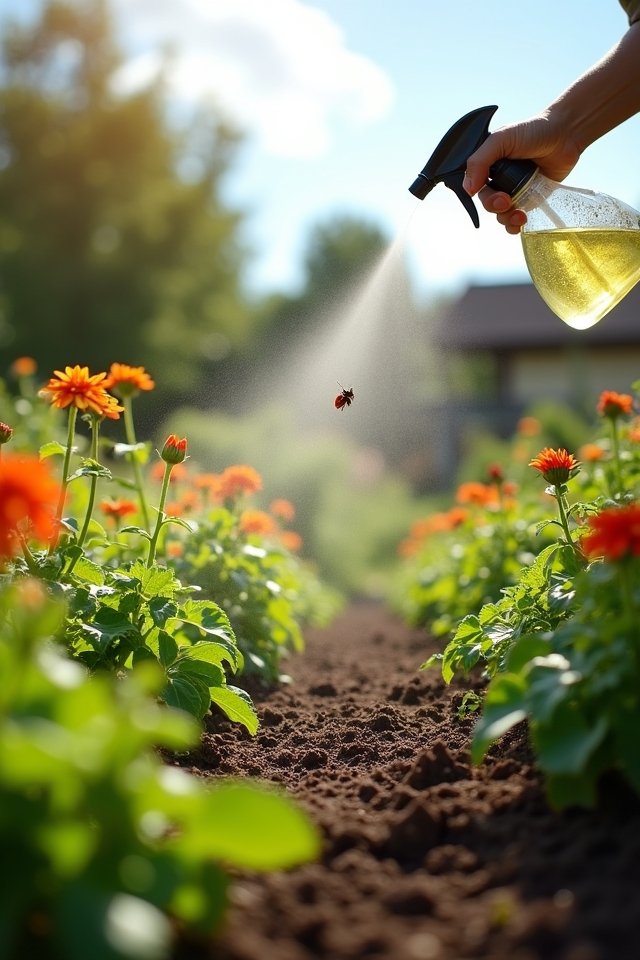
When you think about keeping your garden healthy, sustainable pest control methods not only save the day but also help protect our planet! By adopting these eco-friendly approaches, you’re implementing long-term solutions that work wonders. Consider these sustainable practices:
- Companion Planting: Think of it as best buds teaming up, where certain plants naturally repel pests for each other.
- Natural Predators: Welcome beneficial insects, like ladybugs, who bravely battle your garden’s foes without chemical help!
- Integrated Strategies: Combine physical barriers, like row covers, with organic treatments for a multi-layered defense that really sings!
With these innovative methods, you’re creating a flourishing ecosystem that promotes harmony while keeping your veggies lush and pest-free. Isn’t that a win-win? 🌱✨
Frequently Asked Questions
How Long Does It Take to See Results From Eco-Friendly Pest Control?
You’ll usually notice results from eco-friendly pest control within a week or two! It’s like watching your garden wake up after a long nap. While traditional methods might deliver faster results, they often come with more side effects—think of a loud party crashing your peaceful evening! In contrast, the calm effectiveness of eco-options means you’ll soon see healthier plants, buzzing pollinators, and happy garden critters joining your lush paradise! Exciting, isn’t it?
Are Eco-Friendly Methods Safe for Pets and Children?
Eco-friendly methods are designed with safety in mind, making them perfect for homes with pets and kids. With safety measures like natural ingredients and pet-friendly options, you can keep your garden thriving without the worry of harmful chemicals. Imagine your dog frolicking around without a care—now that’s peace of mind! Plus, by using these techniques, you’re not just protecting your loved ones; you’re contributing to a greener world. How awesome is that?
What Are the Costs Associated With Eco-Friendly Pest Control?
When you think about the costs of eco-friendly pest control, it’s essential to make a good cost comparison! Sure, it might seem pricier upfront, but consider long-term benefits; healthier plants mean fewer expenses later! Budget considerations are key—some natural methods, like neem oil, work magic for a fraction of the cost of synthetic pesticides. Plus, you’ll be saving the planet while you’re at it! Can it get any better than that? Absolutely not!
Can Eco-Friendly Pest Control Methods Be Used Year-Round?
Eco-friendly pest control methods can be effective year-round, thanks to innovative strategies! Think of it like dressing for different seasons; your approach changes, but the goal remains. For instance, during spring blooms, companion planting works wonders, while winter might call for barrier methods. Seasonal effectiveness keeps pests guessing! Plus, you’ll feel like a garden superhero, battling pests with nature’s finest! Who knew pest control could be so engaging and fun? Let’s go green!
Where Can I Find Eco-Friendly Pest Control Products?
You’ll find eco-friendly pest control products at local garden supply stores or online retailers! Check out sustainable brands like EcoSMART or Natural Guard; they boast impressive product certifications! You’ll love browsing sites like Amazon or Home Depot, where options abound. Just remember, it’s like picking the freshest apples at the market—read those labels! Are they certified organic? With a little digging, you’ll discover a treasure trove of green solutions for your garden!


